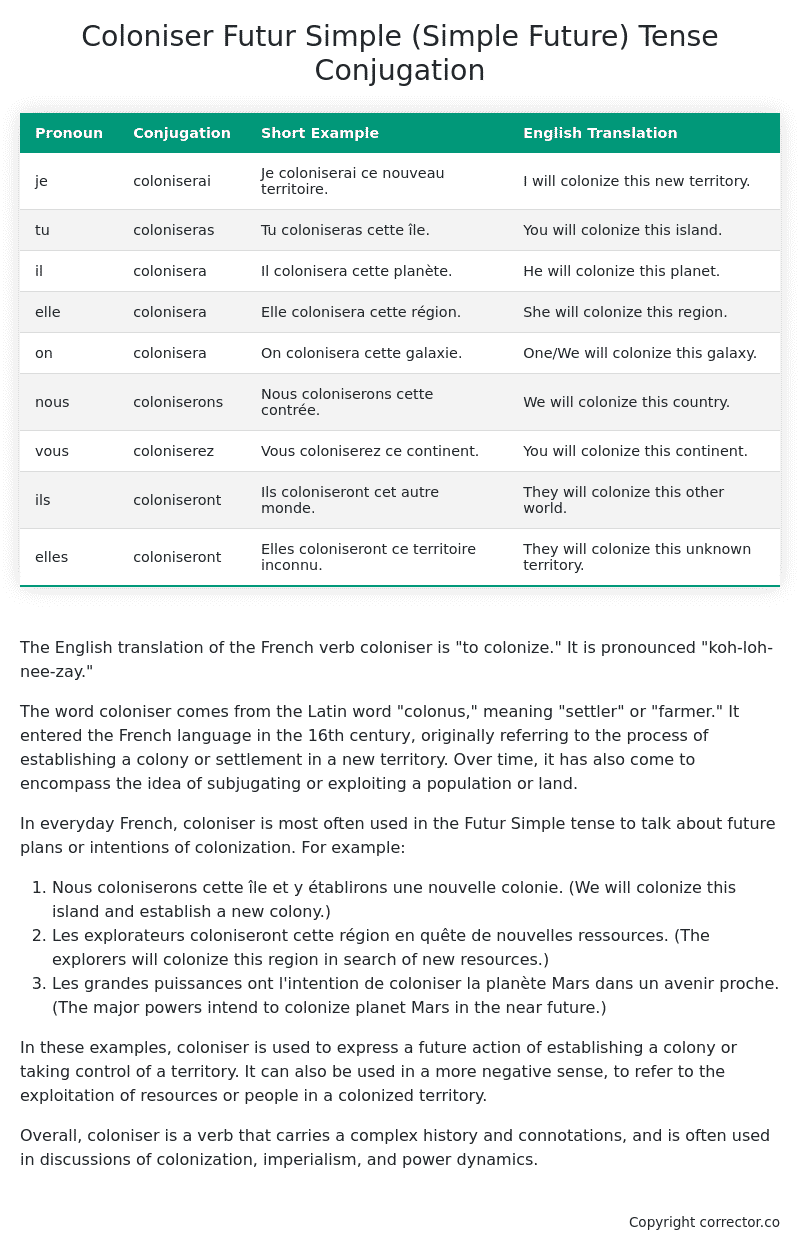Futur Simple (Simple Future) Tense Conjugation of the French Verb coloniser
Introduction to the verb coloniser
The English translation of the French verb coloniser is “to colonize.” It is pronounced “koh-loh-nee-zay.”
The word coloniser comes from the Latin word “colonus,” meaning “settler” or “farmer.” It entered the French language in the 16th century, originally referring to the process of establishing a colony or settlement in a new territory. Over time, it has also come to encompass the idea of subjugating or exploiting a population or land.
In everyday French, coloniser is most often used in the Futur Simple tense to talk about future plans or intentions of colonization. For example:
- Nous coloniserons cette île et y établirons une nouvelle colonie. (We will colonize this island and establish a new colony.)
- Les explorateurs coloniseront cette région en quête de nouvelles ressources. (The explorers will colonize this region in search of new resources.)
- Les grandes puissances ont l’intention de coloniser la planète Mars dans un avenir proche. (The major powers intend to colonize planet Mars in the near future.)
In these examples, coloniser is used to express a future action of establishing a colony or taking control of a territory. It can also be used in a more negative sense, to refer to the exploitation of resources or people in a colonized territory.
Overall, coloniser is a verb that carries a complex history and connotations, and is often used in discussions of colonization, imperialism, and power dynamics.
Table of the Futur Simple (Simple Future) Tense Conjugation of coloniser
| Pronoun | Conjugation | Short Example | English Translation |
|---|---|---|---|
| je | coloniserai | Je coloniserai ce nouveau territoire. | I will colonize this new territory. |
| tu | coloniseras | Tu coloniseras cette île. | You will colonize this island. |
| il | colonisera | Il colonisera cette planète. | He will colonize this planet. |
| elle | colonisera | Elle colonisera cette région. | She will colonize this region. |
| on | colonisera | On colonisera cette galaxie. | One/We will colonize this galaxy. |
| nous | coloniserons | Nous coloniserons cette contrée. | We will colonize this country. |
| vous | coloniserez | Vous coloniserez ce continent. | You will colonize this continent. |
| ils | coloniseront | Ils coloniseront cet autre monde. | They will colonize this other world. |
| elles | coloniseront | Elles coloniseront ce territoire inconnu. | They will colonize this unknown territory. |
Other Conjugations for Coloniser.
Le Present (Present Tense) Conjugation of the French Verb coloniser
Imparfait (Imperfect) Tense Conjugation of the French Verb coloniser
Passé Simple (Simple Past) Tense Conjugation of the French Verb coloniser
Passé Composé (Present Perfect) Tense Conjugation of the French Verb coloniser
Futur Simple (Simple Future) Tense Conjugation of the French Verb coloniser (this article)
Futur Proche (Near Future) Tense Conjugation of the French Verb coloniser
Plus-que-parfait (Pluperfect) Tense Conjugation of the French Verb coloniser
Passé Antérieur (Past Anterior) Tense Conjugation of the French Verb coloniser
Futur Antérieur (Future Anterior) Tense Conjugation of the French Verb coloniser
Subjonctif Présent (Subjunctive Present) Tense Conjugation of the French Verb coloniser
Subjonctif Passé (Subjunctive Past) Tense Conjugation of the French Verb coloniser
Subjonctif Imparfait (Subjunctive Imperfect) Tense Conjugation of the French Verb coloniser
Subjonctif Plus-que-parfait (Subjunctive Pluperfect) Tense Conjugation of the French Verb coloniser
Conditionnel Présent (Conditional Present) Tense Conjugation of the French Verb coloniser
Conditionnel Passé (Conditional Past) Tense Conjugation of the French Verb coloniser
L’impératif Présent (Imperative Present) Tense Conjugation of the French Verb coloniser
L’infinitif Présent (Infinitive Present) Tense Conjugation of the French Verb coloniser
Struggling with French verbs or the language in general? Why not use our free French Grammar Checker – no registration required!
Get a FREE Download Study Sheet of this Conjugation 🔥
Simply right click the image below, click “save image” and get your free reference for the coloniser Futur Simple tense conjugation!

Coloniser – About the French Futur Simple (Simple Future) Tense
Formation of Futur Simple
For regular -er verbs (e.g., parler – to speak)
For regular -ir verbs (e.g., finir – to finish)
For regular -re verbs (e.g., vendre – to sell)
Common Everyday Usage Patterns
Conditional Statements
Interactions with Other Tenses
Futur Antérieur
Conditional
Present
Summary
I hope you enjoyed this article on the verb coloniser. Still in a learning mood? Check out another TOTALLY random French verb conjugation!


